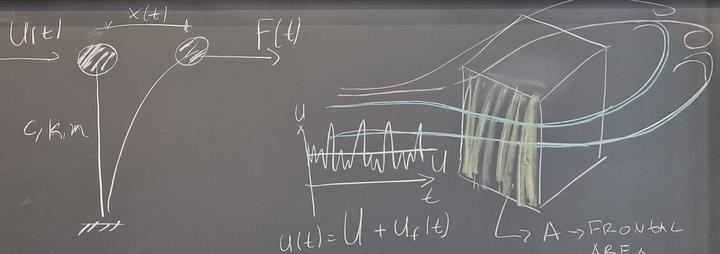Courses

My teaching philosophy centers on the concept of educators actively reconstructing knowledge rather than simply transferring it. This involves a continuous cycle of exposure to new material, independent work, feedback, questioning, and reflection. While not linear, I believe that constructing and reconstructing knowledge is essential for grasping complex concepts. I am happy to exchange experiences - please do get in touch if interested.
I have taught several courses to student groups of varying sizes, including small groups (2 students), medium-sized groups (5-6 students), and large groups (60-80 students), in various capacities:
Visiting Lecturer
- Wind Engineering (MSc course, Bauhaus University Weimar)
- The course covers fundamental concepts of wind engineering, including boundary layer and atmospheric turbulence, bluff body aerodynamics, equivalent static loading (code concepts), as well as advanced analyses of bridge aeroelasticity. Wind tunnel demonstration is included as well.
- Wind-induced Vibrations of Bridges (Bauhaus Summer School)
- Project-based, two-week intensive course focusing on aeroelastic analyses of bridges using Computational Fluid Dynamics (CFD) simulations. Topics covered include vortex-induced vibrations, buffeting and flutter analyses, as well as aerodynamic shape optimization.
Demonstrator
- Dynamics in Civil Engineering (Year 4 MEng course, University of Cambridge)
- This computer lab project focused on the seismic analysis of a high-rise steel building. Topics covered include equivalent lateral loading, response spectrum analysis, and linear time-history analysis.
- Structures Lab (Year 2 MEng course, University of Cambridge)
- Lab exercises for studying structural behavior, covering experiments on shear beam theory, lateral-torsional buckling, Mohr’s circle, and the flexibility method.
- Experimental Structural Dynamics (MSc Course, Bauhaus University Weimar)
- Dynamics system identification through operational modal analysis, involving extraction of modal properties (frequencies, damping, shapes) from acceleration measurements using the Stochastic Subspace Identification method.
Supervisor
- Structural Analysis and Stability (Year 3 MEng course, University of Cambridge)
- Paper supervision for a small student groups on reciprocal theorems, influence lines, buckling and bifurcation of systems with large displacements.
Teaching Associate
- Lifelines Engineering (MSc course, Bauhaus University Weimar)
- Seminars on prestressed concrete bridges. Topics covered include post-tensioning for statically indeterminate systems (losses, tendon profiles), transverse and longitudinal influence lines for traffic loading, as well as reinforced concrete design and construction stages.
- Structural Engineering (MSc course, Bauhaus University Weimar)
- Seminars on reinforced concrete. Topics covered include bending, shear, torsion of beams and plates, and corbel design (strut-and-tie).
- Computational Wind Engineering (MSc project, Bauhaus University Weimar)
- Project-based course focusing on aeroelastic analyses of bridges using Computational Fluid Dynamics (CFD) simulations. Topics covered include vortex-induced vibrations, buffeting and flutter analyses, as well as aerodynamic shape optimization.
- Nonlinear Analysis of Structures: Wind Vibrations (Erasmus+ MSc Project - 5 EU Univ.)
- Similar content as Computational Wind Engineering with students from 5 EU partner universities and 2 weeks intensive lectures in Weimar during one semester.
Student Assistant
- Structural Dynamics (MSc course, Bauhaus University Weimar)
- Tutorials on the fundamental concepts of structural dynamics for both single and multi-degree of freedom systems. Topics covered include dynamic responses to harmonic, unit-step, and random excitations (including the Duhamel integral), modal property determination (frequencies, Rayleigh damping), response spectrum analysis, and base excitation.
- Informatics (BSc course, Ss Cyril and Methodius University Skopje)
- Computer lab exercises on fundamental informatics and AutoCAD technical drawing.